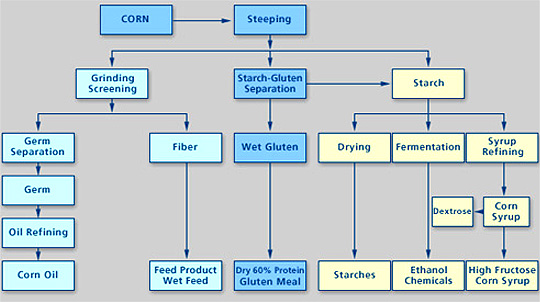Ethanol Production Processes : ›DRY MILLING ›WET MILLING ›CELLULOSIC BIOMASS
WET MILLING

In wet milling, the grain is soaked or "steeped" in water and dilute sulfurous acid for 24 to 48 hours. This
steeping facilitates the separation of the grain into its many component parts.
After steeping, the corn slurry is processed through a series of grinders to separate the corn germ. The corn
oil from the germ is either extracted on-site or sold to crushers who extract the corn oil. The remaining fiber,
gluten and starch components are further segregated using centrifugal, screen and hydroclonic separators.
The steeping liquor is concentrated in an evaporator. This concentrated product, heavy steep water, is codried
with the fiber component and is then sold as corn gluten feed to the livestock industry. Heavy steep
water is also sold by itself as a feed ingredient and is used as a component in Ice Ban, an environmentally
friendly alternative to salt for removing ice from roads.
The gluten component (protein) is filtered and dried to produce the corn gluten meal co-product. This product
is highly sought after as a feed ingredient in poultry broiler operations.
The starch and any remaining water from the mash can then be processed in one of three ways: fermented
into ethanol, dried and sold as dried or modified corn starch, or processed into corn syrup. The fermentation
process for ethanol is very similar to the dry mill process described above.*
*Information & chart cited from www.ethanolrfa.org/pages/how-ethanol-is-made |
















